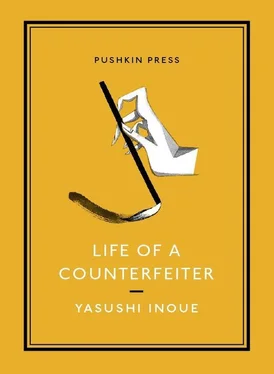I can’t help feeling that there was something about my parents then, as they exist in that fragment of memory, that veered far enough away from the ordinary to inscribe itself forcefully into my childish heart, even if it lasted only for the briefest of moments, and even if they themselves have forgotten it. In this instance I hold one card in my hand, but my parents have lost its pair.
Nearly all these broken-off memories of my childhood involve my parents or my grandmother, but there is one — just one — that revolves around someone who, for the longest time, I could not identify, in some situation at whose nature I could not even guess.
I can’t be certain how old I was, but seeing as I had been put down on my back on the planks of the small boat we were in and covered with a short kimono of the sort women with babies wear — the baby inside, head poking out — I must have been still younger than in the other memories I described, perhaps four or five.
The boat sat at the water’s edge, a spot overgrown with reeds and silver grass and the like, and the sun beat down directly overhead, making it seem very warm and bright. It was spring, most likely.
A man and woman lay a short distance away, embracing each other, and I was watching them. The man wasn’t my father, and the woman wasn’t my mother; it was a couple I didn’t recognize. The man had stretched out on the deck; the woman, just beside him, had tucked her legs under her body and was leaning over the man, covering his upper body with her own. Their faces were touching, struck right up against each other, and I was afraid they might never come apart.
Still, from time to time the woman would turn to look at me. Each time, she would smile, stretch out a fair, uncovered arm in my direction. She would press her hand against my cheek, or lightly caress my lips, again and again, any number of times.
Then, withdrawing her arm, she would curl it around the man’s neck. And once again their faces would be stuck together, as close as could be, and they would stay like that.
Apart from the anxiety I felt about them not coming apart, I felt strangely content watching their unmoving faces; I wasn’t at all restless.
Once, I kicked off the short kimono that was covering me and got up. The woman gave a little cry, came away from the man to scoop me up, and then, either to protect me from the wind or to prevent me from moving any more, tightly wrapped me in the kimono and propped me up with my back against the side of the boat.
In that uncomfortable position, I looked out across the water and at the low hills on the far shore. A scattering of trees dotted the slopes. The lake seemed to narrow in that direction, forming a sort of channel; off to the right, the water fanned outward, stretching into the distance.
The whole shore was covered with thick-growing reeds and silver grass; several wooden platforms rose from the growth, one here, another there, jutting out over the water, a small boat tied up at each one. I didn’t see any other people — just the lake, and the reeds and grasses on its shore, and the few hills surrounding the lake, everything shining brightly in the sun.
They left me in that position, unable to move, until I could hardly endure it anymore. The man and woman stayed with their faces crushed together; I waited and waited, but they didn’t separate. This time, I felt sure their faces really had gotten stuck.
Eventually it got to be too much for me, and I burst out crying, shrieking as loudly as I could. The man got up and came and lifted me into the air. When I kept crying, he stepped down from the boat into the water, still carrying me, and began walking around the boat, splashing water into the air, presumably hoping this would amuse me. The water was quite shallow. The woman lay on her back in the boat. Once again, she stretched out her bare arms toward me.
The memory breaks off here. I have no recollection of where the two of them took me after that, or how I got home.
This fragment of memory bore no relation to anyone I knew. I had no idea where it might have taken place. For a very long time, I walked around carrying this card, having no notion of how it had found its way into my hands, without ever showing it to anyone.
For years, my memory of this time I spent with a young couple — I assume they must have been young — while they engaged in a bit of romance just sat there inside me, undisturbed; I made no attempt to look into it. I couldn’t have looked into it even if I had wanted to, and in any case the meaning of this particular picture, on this one card, seemed clear enough.
When I was a student, I regarded the passions as something gloomy and depressing, like a mass of loathsome black snakes writhing about inside our bodies, but there was nothing dark or gloomy in the romantic scene between the couple in my memory, not even a sense of furtiveness. Everything about it was bright and clear, as far as I could see. The brilliance of that memory is what enabled me, even as a student, when I looked on the passions as something foul, even as I suffered night and day on their account, alternately railing against them and becoming their prisoner, to see affairs of the heart, in my own twisted way, as an element of life that I could affirm. If it weren’t for this memory, I’m sure that during a certain period in my life I would have been more dismally scarred than I was, and suffered more, from my encounters with such feelings.
I found myself driving along the shore of the long, irregularly shaped Lake Kitakata on my way from Daishōji, in the Hokuriku region, to Fukui prefecture in the spring of Shōwa 24—or 1949, the year after the great-earthquake there. I was working for an Osaka newspaper at the time, and was making the rounds of a few cities in the region — Komatsu and Daishōji and so on — preparing a series of articles about the progression of the recovery a year after the quake.
We entered the village of Yoshizaki and turned by the temple known for an old mask a woman is said to have worn long ago to frighten her daughter-in-law, and all of a sudden Lake Kitakata lay before us, small waves glittering splendidly in the sunlight all across its surface. The car crossed over to the other side at a point near the northern tip of the lake, where it narrowed to the width of a river, and from then on we drove along the right-hand shore. Low hills rose above the road on the other side, and beyond them, I had been told, was the Sea of Japan; but it didn’t feel as though the ocean was so close. Here and there the earthquake had caused landslides that looked as if they could have happened yesterday.
The car drove twenty minutes along the shore of the long, narrow lake — twenty-four kilometers around, I had heard. Then, just as we were about to enter the village of Kitakata, I suddenly broke off the conversation I had been having with the driver and asked him to stop the car. All at once, it had occurred to me that the lake in that childhood memory of mine looked a lot like this. It was slightly past noon now, too, in spring, and the water was shining.
I got out of the car and stood on the shore. “Unusual for a lake to be so bright, isn’t it?”
“It’s only because it’s spring; from fall on into winter it gets real dark here, actually — you get this feeling of solitude driving in this vicinity that I can’t even describe. There’s nothing else out here but this lake, after all, like a big puddle.”
The driver pointed out a landslide visible on a distant hill and told me that even now some of the houses up there were still buried. I couldn’t tell from the way he spoke whether the sense of solitude he had mentioned came from the landscape around the lake, or from the fact that there were houses buried under the ground. Either way, though I could see the area probably looked pretty desolate in winter and fall, just as he said, it was hard to imagine with the spring sunlight streaming down all around.
Читать дальше












